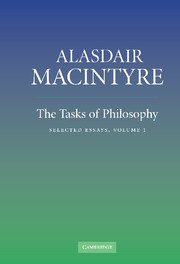Book contents
- Frontmatter
- Contents
- Preface
- Acknowledgments
- PART I DEFINING A PHILOSOPHICAL STANCE
- PART II THE ENDS OF PHILOSOPHICAL ENQUIRY
- 7 The ends of life, the ends of philosophical writing
- 8 First principles, final ends, and contemporary philosophical issues
- 9 Philosophy recalled to its tasks: a Thomistic reading of Fides et Ratio
- 10 Truth as a good: a reflection on Fides et Ratio
- Index
7 - The ends of life, the ends of philosophical writing
Published online by Cambridge University Press: 05 June 2012
- Frontmatter
- Contents
- Preface
- Acknowledgments
- PART I DEFINING A PHILOSOPHICAL STANCE
- PART II THE ENDS OF PHILOSOPHICAL ENQUIRY
- 7 The ends of life, the ends of philosophical writing
- 8 First principles, final ends, and contemporary philosophical issues
- 9 Philosophy recalled to its tasks: a Thomistic reading of Fides et Ratio
- 10 Truth as a good: a reflection on Fides et Ratio
- Index
Summary
We are sitting with friends at a diner or standing in line to buy tickets for a movie, chatting idly, when suddenly one of us, unable to contain himself in the face of our trivialities, bursts out with some existential question which we might later on paraphrase in polite terms as “What is it to live a human life well or badly?” or one which we might paraphrase as “What law, if any, has authority over us?” or one which we might paraphrase as “What is the significance of death in our lives?” The questions that actually burst out on such occasions will be expressed in cruder and rawer terms, as much a scream as an utterance, whose obscenities can be heard as expressions of anger and pain. And the response by those who hear both the questions and the emotions expressed through them is likely to be deep embarrassment, a strong wish to change the subject, a will to behave as if the questions had not been asked. We think: what can have got into him to talk like that? Is he perhaps having a break-down?
Yet provide these very same questions with a different context, that, say, of a graduate seminar in philosophy, utter them in a quiet academic tone of voice and in a suitably purged vocabulary, and they no longer sound naive, they no longer evoke embarrassment.
- Type
- Chapter
- Information
- The Tasks of PhilosophySelected Essays, pp. 125 - 142Publisher: Cambridge University PressPrint publication year: 2006
- 5
- Cited by

